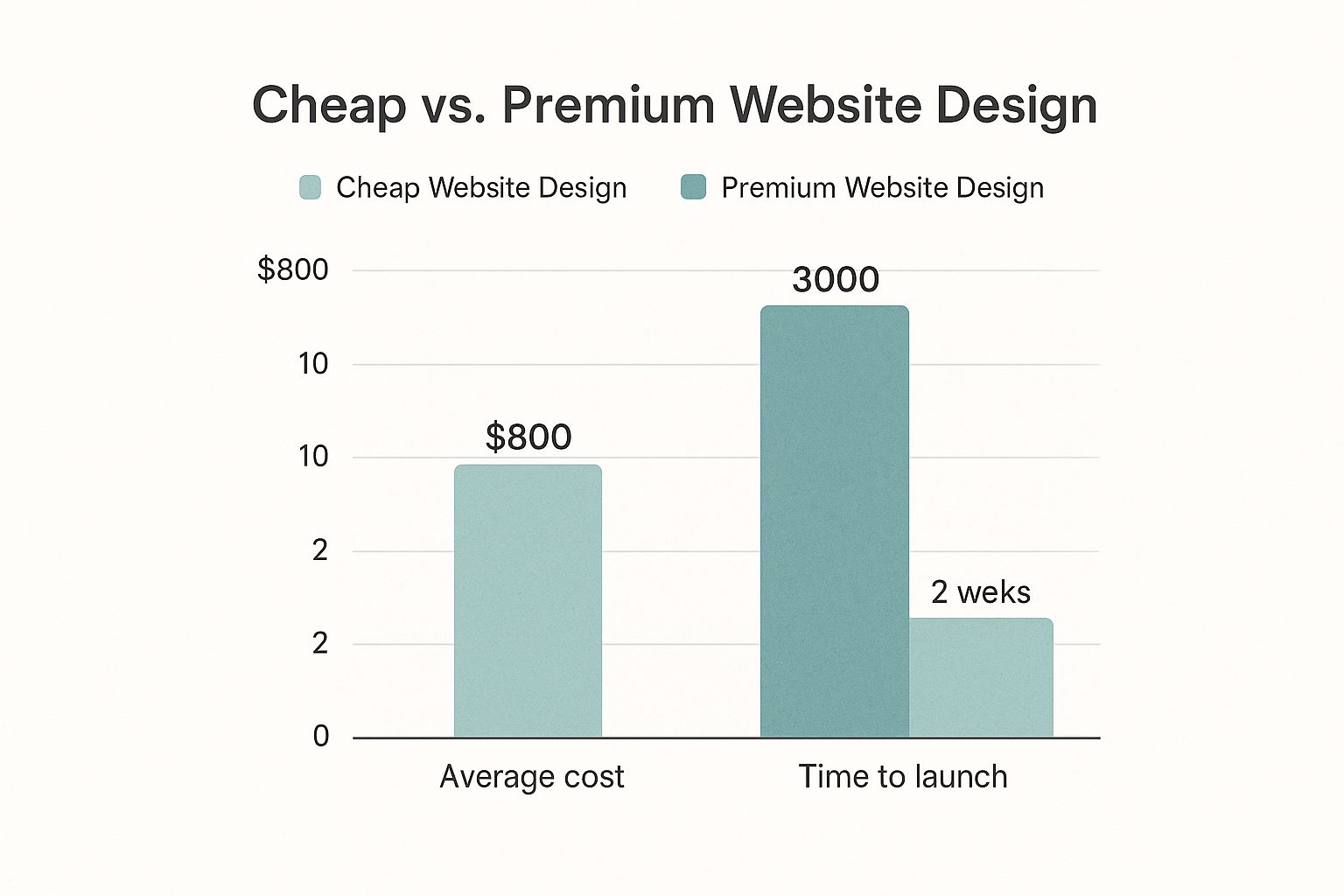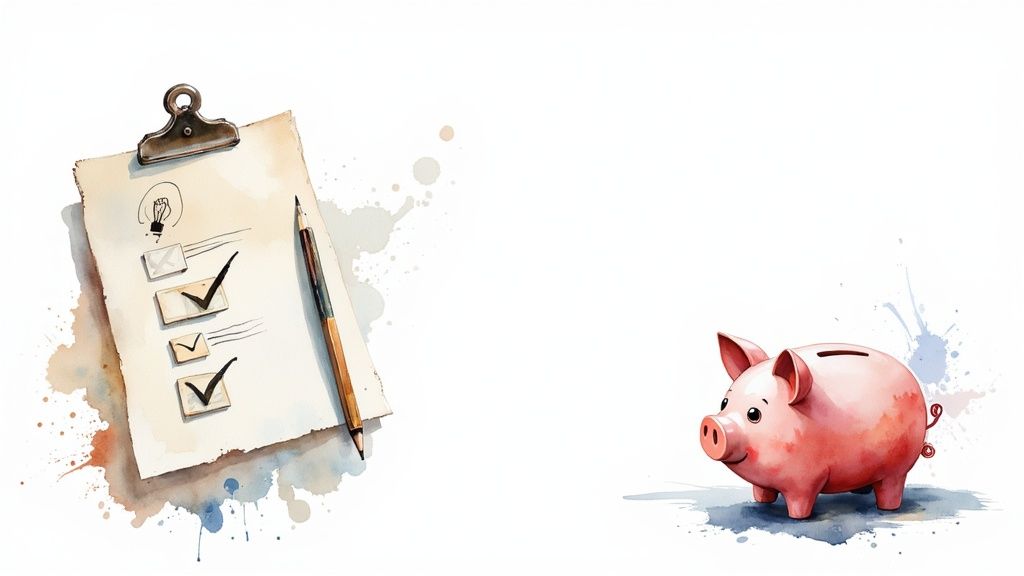Cheap Website Design That Helps Your Small Business Grow
Discover affordable website design with our cheap website design solutions. Get a professional website that drives results without breaking your budget.
When you're a small business owner searching for "cheap website design," what you're really after isn't just the lowest price. It's about getting the absolute best value for your money—a professional online presence that actually brings in local customers, without draining your startup capital. It’s a smart investment in your growth.
What Does Affordable Website Design Really Mean?
For many local business owners, the word 'affordable' can feel like a trap. It often conjures up images of clunky, DIY websites that look unprofessional and do more harm than good. But it doesn't have to be that way.
True affordability isn't about the initial invoice; it's about the long-term return on investment. A website that costs next to nothing but generates zero leads is actually far more expensive than a well-priced site that consistently brings in new business.
The trick is to shift your focus from 'price' to 'value'. In Australia, website design costs are all over the map. You can dive deeper into these figures with a detailed Australian market analysis, but the real challenge is understanding the risks at either end of the spectrum.
Website Design Options At a Glance
To help you navigate these choices, here’s a quick breakdown of what you can expect from the most common approaches.
| Approach | Typical Cost (AUD) | Best For | Key Trade-off |
|---|---|---|---|
| DIY Builders | $30 - $100 / month | Hobbyists or those with a lot of time and technical confidence. | Very time-consuming; often lacks professional polish and SEO fundamentals. |
| Freelancers | $1,000 - $10,000 | Businesses needing a custom touch but without a huge budget. | Quality and reliability can vary wildly; finding the right person is crucial. |
| Full-Service Agency | $10,000+ | Established businesses with complex needs and a large budget. | High cost; may include features and overhead you simply don't need. |
Ultimately, the best path for most small businesses is one that finds a balance—getting professional results without the enterprise-level price tag.
The Pitfalls of Price Extremes
Opting for the absolute cheapest option almost always means cutting corners on things that really matter for a local business:
- Search Engine Optimisation (SEO): If Google can't find your site, your local customers won't either. It's that simple.
- Mobile-Friendly Design: Most of your customers will find you on their phone. If your site is a mess on mobile, you’ve lost them in seconds.
- Professional Appearance: A sloppy, amateur-looking site instantly erodes trust and makes your business look less credible.
On the flip side, overpaying for a high-end agency website often means you're funding complex, bespoke features you'll never actually use. It’s a waste of precious cash that could be better spent on local marketing.
The sweet spot is a solution that avoids the compromises of cheap DIY platforms and the excessive costs of large-scale custom projects. It’s about getting exactly what your small business needs to grow.
This is where the difference between a "cheap" site and a truly valuable one becomes clear.

As you can see, the trade-offs in time, money, and quality are significant. This highlights the need for a balanced approach—one that delivers the quality and strategic thinking of a professional build at a price that makes sense for a growing local business.
The Pitfalls of Paying Too Little for Web Design

For a small business, grabbing the absolute cheapest website deal can feel like a savvy move. But it's often a trap that costs you more in the long run. Think of your website as your digital shopfront. You wouldn’t use a cardboard sign and a broken lock on your physical store; it would drive customers away and put your business at risk. The same logic applies online.
A rock-bottom price tag usually means you're sacrificing the very things that make a website an effective tool for winning new business. These hidden costs won't show up on an invoice, but they can seriously damage your growth.
The True Price of 'Cheap'
The real danger with an ultra-cheap website isn't what it includes—it's what it leaves out. These budget options almost always cut corners on essentials:
- Zero Google Visibility: A cheap site is almost never built with Search Engine Optimisation (SEO) as a priority. This means it’s effectively invisible to Google. When potential local customers search for your services, they’ll find your competitors instead.
- Poor User Experience: If a website is slow, confusing to navigate, or looks broken on a mobile phone, visitors will give up and leave. A frustrating experience destroys trust and sends potential leads straight to your rivals.
- Security Vulnerabilities: Low-cost providers often skip basic security measures, leaving your website—and potentially your customers' data—wide open to hackers.
For a local business, your website is your digital handshake. A cheap, poorly made site quietly tells potential customers you don't value professionalism, which can be a deal-breaker before they even think about contacting you.
Beyond the Initial Price Tag
The financial hit doesn't stop once the site is live. A cheap website often creates ongoing headaches that drain your time and money. You might find yourself stuck with a platform you can't update, get hit with unexpected fees for simple support, or even discover you don't actually own your own website files.
That initial saving evaporates pretty quickly when you have to pay someone else to fix all the problems or, even worse, start over from scratch. To make a genuinely smart decision, it's crucial to understand how much a quality website should cost and what you should expect for that investment.
The Risk of Paying Too Much for a Small Business Website

While it’s wise to be wary of bargain-basement prices, the other end of the scale can be just as risky for a small business. It's surprisingly easy to get talked into an expensive website loaded with complex features you simply don't need.
Think about it. If you're a local tradie or a café owner, paying top dollar for enterprise-level features like custom databases or complicated API integrations is complete overkill. It’s like buying a prime mover just to do the odd Bunnings run. That money could be far better spent on local advertising or other marketing activities that actually bring in new customers and grow your business.
Avoiding Unnecessary Costs
Inflated quotes often hide behind a wall of technical jargon. The best way to protect your budget is to ask any designer or agency to break down their proposal in plain English. If they can’t explain it simply, that’s a red flag.
Here are a few common upsells a small business should question:
- Custom Integrations: Does your site really need to connect with highly specialised third-party software right from day one? For most service businesses, the answer is a firm no.
- Bespoke Content Management Systems (CMS): A custom-built CMS might sound impressive, but it often locks you into that specific developer for every single update and bit of support. This can get very expensive, very quickly.
- Elaborate animations and effects: Sure, they can look cool, but over-the-top animations often slow your site to a crawl, which frustrates visitors and can even hurt your Google ranking.
A good web design partner for a small business won’t try to sell you things you don't need. Their focus should be on what delivers the best return on your investment—things like solid SEO, fast loading times, and a crystal-clear way for customers to get in touch.
Finding that sweet spot is the real goal here. You need a website that's more professional and effective than a basic DIY job, but without the eye-watering price tag of a full-blown custom agency build. This sensible middle ground is where you get a high-quality, growth-focused website that provides genuine value for money.
Finding the Sweet Spot: Great Value Web Design

So, we've seen the two extremes. Paying too little gets you a website that doesn't work, and paying too much drains your budget on features you’ll never use. For a small business, both are a waste of money. The real win isn't finding the cheapest design; it's about making the smartest investment.
This is where you find the powerful middle ground—a solution that delivers genuine, professional quality without the eye-watering price tag of a huge custom agency. For a savvy local business owner, this is the sweet spot.
The Smart, Strategic Choice for Small Business
This is where a service like SiteStarter comes in. We recognised that small businesses were getting caught between ineffective DIY builders and overpriced agencies. We created a sensible middle ground that offers the best of both worlds: professional quality at an affordable price.
A SiteStarter website isn't just cheap; it’s great value. It's built from the ground up to help you grow:
- Professional Design: A polished, modern look that builds instant trust and credibility with your customers.
- Essential SEO: We build in the foundational SEO that helps local customers actually find you on Google.
- A Growth-Focused Build: Your website is fast, secure, and built on a solid technical base that can evolve as your business grows.
The goal is to get a site that delivers a tangible return on investment. It should be a lead-generating machine for your local business, not just a digital brochure that gathers dust.
With SiteStarter, you avoid the pitfalls. You get a professionally designed, SEO-ready website that's engineered for growth, allowing you to focus on running your business. It's the sensible choice for owners who expect their website to work as hard as they do. To see just how much a bad site can hurt your bottom line, check out our guide on the hidden cost of a slow or outdated website.
Matching Your Website Type to Your Business Needs
Not all websites are built the same, and their price tags are a direct reflection of what they're designed to do. Before you even think about a budget, the first and most important step is figuring out what your business actually needs from a website.
It helps to think about it like this. A simple site for a local plumber is basically a digital business card. It needs to look professional, explain their services, and give people a clear way to call them. But an e-commerce store is more like a physical shop. It needs product displays, a checkout system, and a way to manage inventory. Every extra function adds another layer of complexity, and that's where the costs start to climb.
Setting a Realistic Budget
Understanding this difference is crucial before you start talking to a designer. For example, a standard informational website with five to ten pages will generally set you back between AUD $1,500 and AUD $5,000. On the other hand, even a basic e-commerce site involves a lot more moving parts, with prices typically starting around AUD $5,000 and climbing to $15,000 or more. If you're curious, you can dig deeper into these Australian website design cost benchmarks to see exactly how different features affect the final price.
For many small and local businesses, a clean, professional informational site is the perfect launchpad. It builds trust, captures leads, and does its job without the hefty price tag of e-commerce features you might not even use. The whole idea is to focus on what's essential to get a great result without breaking the bank.
The smartest investment is a website that matches your current business needs while being ready to grow. Overspending on unnecessary features is as wasteful as underspending on a site that can't be found by customers.
A well-planned site gives you everything you need to start attracting customers online. If you're weighing up your options, our guide on the top website builders for small business is a great resource for comparing different platforms and what they do best.
Key Questions About Affordable Web Design
Diving into a new website for your business is a big step, and it's only natural to have a few questions swirling around. To help you feel confident about your decision, let's tackle some of the most common worries we hear from small business owners looking for a great deal on web design.
How Can I Tell if a Quote is Too Good to Be True?
A good web design partner, even a budget-friendly one, is always transparent. You need to be on the lookout for a few red flags. A missing portfolio is a big one. So are vague proposals that don't clearly state what's included—things like mobile optimisation or basic SEO.
Be wary of high-pressure sales tactics, too. A trustworthy professional will give you a clear, detailed breakdown of every deliverable and be straight up about who actually owns the website files when the job is done.
Is SEO Really Necessary for My First Website?
Yes, one hundred percent. A stunning website is pretty much useless if no one can find it. Foundational Search Engine Optimisation (SEO) isn't some fancy add-on; it's a core part of making sure local customers can actually discover you on Google when they're searching for what you offer.
Any quality affordable web design solution must include, at a minimum, basic on-page SEO. This gives your business a fighting chance to appear in search results and attract paying customers from day one.
What's More Important: A Low Upfront Cost or Low Ongoing Fees?
This is a great question. It's all about the 'total cost of ownership' over a few years. Some DIY website builders look incredibly cheap to get started, but they often lock you into high monthly fees that just keep climbing, especially as you add features your business can't do without.
Often, a one-off investment in a quality website that you own outright is much more cost-effective in the long run. The smartest move is to find a sensible balance: something that works for your cash flow right now but also sets you up for future growth.
Ready for a website that delivers real value without the huge agency price tag? SiteStarter builds professional, SEO-ready websites designed to get your small business found by more customers online. Learn how we can help you grow.